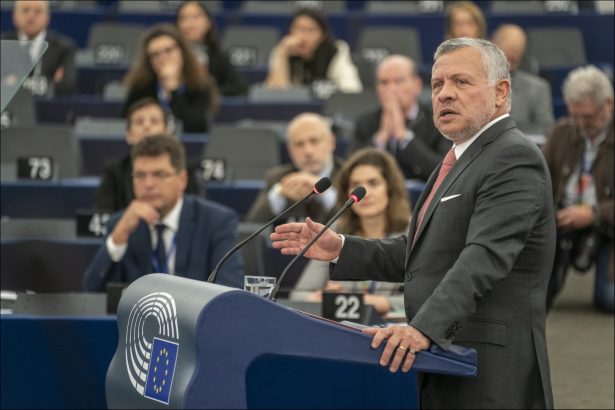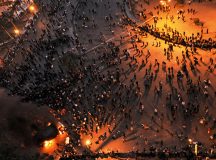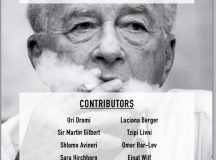Defying the Skeptics
Jordan recently launched its centennial celebrations, defying the skeptics, who over the years had predicted the kingdom’s demise on countless occasions. Jordan, it was thought, was an artificial creation that was bound to collapse sooner or later. In July 1958, for example, shortly after the overthrow of the Hashemite monarchy in Iraq, Britain’s minister of state for foreign affairs, Anthony Nutting, observed that it was difficult to avoid the conclusion that the days of the young King Hussein were numbered.[1]
The real question, however, was not whether Jordan would collapse or disappear, but rather how had the kingdom survived for so long, against the odds, and in contrast to the fate of its neighbors in the Fertile Crescent, whose future was ostensibly far more promising. Jordan’s potentially more powerful neighbors, like Iraq and Syria, have for years been in the throes of domestic crisis and internal collapse, with hundreds of thousands of their citizens seeking refuge in the relative safety and stability of Jordan.
Britain’s Colonial Secretary, Winston Churchill, claimed to have founded the Emirate of Transjordan ‘one afternoon’ in March 1921.[2] The Emirate was formed then as part of the British Mandate for Palestine following talks with the Amir (later King) Abdallah bin Hussein (reigned 1921-1951). In his final years on the throne, Jordan’s neighbors did not believe the kingdom would last after Abdallah. The same was true when many doubted whether Jordan would survive the end of King Hussein’s reign after his 46 years in power (1953-1999). But, as opposed to these pessimistic assessments, Hussein’s son, King Abdallah II has been on the throne for 22 years.
Artificiality is Relative
In fact, Jordan was an artificial creation. When the Emirate was founded in the 1920s it did not include even one city to speak of. Amman was just a village, mainly Circassian, with hardly 2,500 inhabitants. Only one town, al-Salt, had a population of about 20,000. Most of the country was an underpopulated and impoverished desert with no natural resources. In contrast, its neighbors in the Fertile Crescent were wealthier, more fertile and more densely populated, established around capital cities with glorious histories, like Beirut, Damascus and Baghdad. Lebanon, Syria and Iraq seemed far more naturally state-like. But that was actually an illusion.
In one critical feature Iraq, Syria and Lebanon differed markedly from Jordan and it was this feature that spelt their undoing. All three were heterogeneous conglomerates of multiple sects that did not exist in Jordan. Jordan is 90-95 per cent Sunni Muslim and Arab. In this respect, Jordan is more similar to homogeneous Egypt than to its heterogeneous neighbors in the Fertile Crescent, whose sectarian conflicts have led to their destruction. Jordan is indeed divided between the original East Banker Transjordanians and its large Palestinian population. But these are relatively new national identities that have only taken root in the latter part of the 20th century. They are historically shallow in comparison to the sectarian identities that originate in the early 7th century.
Moreover, these new national identities are not a social fault line, in marriage for example, as the sectarian divisions are. Jordanians and Palestinians marry each other as a matter of course, usually Muslims with Muslims and Christians with Christians. There are real and palpable tensions between Jordanians and Palestinians, but in these days of more emphatic sectarian schisms their sectarian common ground tends to outweigh their national divisions.
Despite its artificial beginnings, with the passage of time, Jordan developed three characteristics that set the stage for its long-term stability. 1) An East Banker political elite gradually coalesced, in support of the monarchy and the Jordanian state, and the political status quo. Jordan was their political patrimony and they had no other. They had a vital self-interest in its preservation as their guarantee for self-determination. 2) A relatively large security establishment, including the armed forces and the various domestic security and intelligence services (in all of which the Bedouin tribes were powerfully represented), supported the monarchy and the ruling political elite. 3) Jordan’s geopolitical centrality, at the heart of the Fertile Crescent and at the core of the Palestine question, has always accorded the kingdom crucial importance in the eyes of local and external powers as a regional stabiliser and shock absorber. Great powers, past and present, have always been prepared to offer Jordan the required strategic and financial assistance in its role as a linchpin of regional security.
Personalities and Politics
Though King Abdallah II has been on his throne for 22 years, he is still often compared, mostly unfavorably, to his father Hussein. He has found it difficult to fill Hussein’s shoes and to establish a monarchical presence of his own, outside of his father’s shadow. When Hussein was in his thirties, he had already led Jordan through the 1967 war with Israel, the ‘Black September’ civil war with the PLO forces in 1970, and the post-October War diplomatic process of the mid-seventies. No one ever compared him to King Abdallah I, who was a distant memory from another era. Hussein by then was a well-established and respected leader in his own right. Abdallah II has yet to achieve a similar stature. Unwittingly Abdallah contributed to his own diminution, often justifying his decisions as following in his father’s footsteps, even though he is now 59 years old, almost the age of Hussein when, as the father of the nation, he died at 63.
It is customary these days to discuss the Arab states through the prism of a decade since the ‘Arab Spring.’ In Jordan, the real historical turning point was the death of Hussein in February 1999. Jordan, however, is not a ‘one-man show’. The kingdom enjoys institutional and organisational continuity, in the hands of an effective governing elite even when the figure at the top of the pyramid is somewhat less charismatic and less popular than his predecessor.
Hussein and Abdallah were very different personalities. Abdallah received all his formal education, from elementary school onwards, in England and the US. He spent most of his life until his mid-twenties growing up and maturing abroad. Hussein also studied for a few years in his teens in England. But this was foreign territory for him and he never lost his intimate attachment to Jordan and its people. The Jordanians admired Hussein’s command of Arabic, while Abdallah was sometimes the object of ridicule because of his faulty language. Hussein was a great communicator in direct contact with the public through his many speeches and interviews. Abdallah, on the other hand, made far more speeches to foreign audiences abroad than to his own people in Jordan.
Hussein, since his youth, learnt the ways of the tribes through his intensive exposure to their values and traditions under the watchful eye of King Abdallah I, his dear grandfather and political mentor. Conversely, King Abdallah II’s upbringing did not include intimacy with tribal mores and politics, which were second nature to Hussein. Abdallah was even disrespectful at times towards tribal elders, whom he once dismissed impatiently as ‘dinosaurs.’ [3]
Hussein, in accordance with the demands of his time, was a man of high politics, inter-Arab affairs and international politics. He did not know much about economics and left that to others. Abdallah, on the other hand, has focused on Jordan’s economic reform as his top priority since his very first days on the throne.
Economic Reform and the Erosion of the Socio-Political Order
Jordan’s economic troubles entered crisis mode already in Hussein’s time. As of the late 1980s it was clear that the Jordanian economy was failing to keep up with the rapid population growth. Jordan’s unwritten social contract was based for decades on the promotion of the loyalty of the East Bankers to the regime, in exchange for the state’s guarantee of their economic security. When the crisis broke in the late 1980s Jordan was compelled to reduce government spending and to privatise public enterprises in exchange for an economic bailout package from the World Bank and the IMF.
Hussein began the process by gradually introducing new economic policies, but under Abdallah reform was noticeably accelerated. Abdallah was far less sensitive than Hussein to the socio-political fallout of neo-liberal policies. In his mind the reforms were an unavoidable necessity for the kingdom’s long-term survival. Abdallah’s approach had a price that appeared in the form of steadily increasing tensions between the monarchy and the historical backbone of the regime, the East Bankers in general and the tribal hinterland in particular, who were the most seriously affected by the reforms.
Cutbacks in government spending hurt those who were traditionally dependent on government jobs, in the bureaucracy, the military and the security services. Privatisation of public enterprises usually benefited wealthy Palestinians (that at least was the public perception, which might have been off the mark) who were most influential in the private sector. Due to the longstanding preference for East Bankers in the public sector, it was only natural for the Palestinians in the kingdom to gravitate towards the private sector, where they excelled in business and in the professions. The new neo-liberal approach was generally beneficial to the private sector, giving rise to the East Banker complaint that the king actually favored the Palestinians, despite the East Bankers’ unswerving loyalty to the monarchy, which had kept the Hashemites in power in Jordan.
The fact that Abdallah was married to a Palestinian (Queen Rania) did not make matters any easier and East Bankers tended to complain of her so-called excessive influence over the king’s decisions. If in the more distant past the Palestinians were the main body of the opposition to the monarchy and the East Bankers the backbone of the regime, in recent decades a palpable shift has taken place. Many of the Palestinians in Jordan support the monarchy, which has impressively improved their lot. They sought to be fully integrated into the kingdom as equals, whereas the main opposition to the monarchy was now to be found amongst the East Bankers. It was they who were on collision course with the king and it was in their ranks where disapproval of Abdallah was most widespread. The cracks in the edifice of the East Banker elite were serious.[4]
In the eyes of many East Bankers Abdallah was an outsider, too Western and not really one of them. There were some who said of him that he was more comfortable in the company of foreigners than with other Arabs.[5] Abdallah, in appointing officials, believed also in merit and not just loyalty. Tribal East Bankers complained that instead of traditional loyalists like them, Abdallah preferred ‘the digital crowd.’[6] Abdallah, in turn, had his frustrations with East Bankers, and thus his angry reference to tribal elders as ‘dinosaurs,’ who were holding Jordan back.
In the ‘Arab Spring’ these tensions flowed into the streets of Jordan’s towns and cities. Along with the relatively restrained protests by the Muslim Brotherhood and their body of mainly Palestinian supporters, there were many demonstrations, far less restrained, by the tribal younger generation. In their demonstrations, during and after the ‘Arab Spring,’ slogans were often provocative in the extreme. They chanted against the king and the queen, accusing them of corruption, calling not only for reform but, at times, even for the ouster of the monarchy.
During the ‘Arab Spring’ numerous protest movements were established by the younger generation of tribesmen that came to be generally known as the Hirak (movement). This was a popular movement the likes of which had never been seen before in Jordan: spontaneous organisations of young tribesmen, throughout the kingdom, with no clear structure or organisational connection, representing wide scale disaffection amongst the ‘angry tribes’ against the regime.
The new opposition had its limitations too. The Hirak represented the grievances of the younger generation of tribesmen whose future was most uncertain, in comparison to the majority of the tribal elders who remained loyal to the regime, as did most of the tribesmen. When Hirak activists were apprehended by the security services, who were tribesmen just like them, they were not let off lightly. On the contrary they were often given especially harsh treatment for having damaged the tribes’ reputation.[7] Needless to say, not all tribesmen took part in the protests, as many of them employed in the government (the ‘haves’) did not necessarily identify with the demonstrators (the ‘have nots.’)
The Hirak had no united leadership, nor any well-devised platform, or alternative to the Hashemite monarchy. The Hirak protests called for democratic reforms, which could have been a double-edged sword. A real democratic process could have brought the Muslim Brotherhood or the Palestinian majority (55-60 per cent) or a combination of both, to power, hardly the objective of the tribes. Moreover, most Jordanians were afraid to rock the boat. Jordan, relatively speaking, was an island of stability in a turbulent neighbourhood. The general public was horrified by the bloodshed in Syria and Iraq and they dreaded a repetition in their own backyard of the breakdown elsewhere. The opposition, accordingly, tended to act with a measure of caution and restraint.
Searching for a New Social Contract
Yet in the face of a rapidly growing population, the old social contract – that had promised stability and state services, like health and education, economic security, employment and food subsidies, in exchange for the acceptance of an essentially authoritarian regime – was no longer feasible. Jordan, like other Arab states was in urgent need of a new social contract, but there was none immediately available, nor anywhere in sight. Since the ‘Arab Spring’ an atmosphere of disquiet has prevailed, as the country seemed to be muddling through from one crisis to the next.
The civil war in Syria drove hundreds of thousands of Syrians to seek refuge in Jordan. Joining hundreds of thousands of Iraqis from a decade earlier they imposed a heavy burden on an already struggling economy and on the kingdom’s infrastructure. In early 2014, a prolonged protest that went on intermittently for a few years, began against Jordan’s gas agreement with Israel. In the summer of 2018, the country shook again with popular protest, this time against a new income tax.
The complaint of the protestors was that the dwindling middle class was expected to pay more taxes to cover for the ineptitude of the government that would not, or could not, clean up the systemic corruption that was draining the country’s resources. At the beginning of 2019 the ‘march of the unemployed’ began from the south to Amman receiving substantial supportive media coverage. In the summer of 2019, a teachers’ strike broke out and went on for a month. When their protest resumed a year later the regime’s repressive instincts led to sweeping arrests and to the disbanding the teachers’ union.
In early 2020 the Covid-19 pandemic struck. In Jordan, like elsewhere, it is not yet over, and the damage has been severe. At first the authorities seemed to be doing a good job, but, in the early months of 2021, as the pandemic moved into its second year, infection surged. Public censure of the government and protests against mismanagement peaked in mid-March when several patients died in a government hospital due to a negligent operation of the oxygen supply.[8] Covid-19 deaths passed the 9000 mark by early May, placing Jordan at 900 deaths per-million (among the highest in the region).
The pandemic further weakened Jordan’s already battered economy, postponing efforts towards a possible recovery to some undetermined point in the future. Jordan’s economy had not achieved an annual growth rate above two per cent since 2016. The national debt before the Covid crisis was already at 95 per cent of the GDP. The kingdom had a deteriorating infrastructure and it was desperately short of water. The critical tourism industry was disrupted by the pandemic and the country’s economic challenges produced ‘an army of unemployed,’ especially amongst women and youth (said to be as high as 55 per cent amongst those aged between 15 and 24).
As if all that was not enough, remittances from the half-a-million Jordanian expatriates in the Gulf dropped from $6 bn in 2014 to $3 bn in 2020, and they may fall further to just $1bn in the next two years due to falling oil prices. Poverty is rife with huge gaps between the haves and the have nots.[9] At a time when Jordan urgently needed more aid there was less available. After 2014, in the wake of the sharp downturn in oil prices, financial aid to Jordan from Saudi Arabia and the Gulf declined substantially.[10] Maintaining food security and social stability was becoming increasingly difficult.[11]
The Hamzah Affair
In early April 2021, just as Jordan geared up to launch its centennial celebrations, the kingdom’s ongoing domestic crisis came to a head in an extraordinary clash of sibling rivalry within the royal family, between King Abdallah and his younger, 41 year–old half-brother, Hamzah, an event that tested Jordan’s historical stabilising assets.
The ‘Hamzah Affair’ was not just another spat in the family. It was an unprecedented clash of personalities and politics that might not be easily resolved. It represented a coalescence of forces between Jordan’s disaffected East Banker opposition and a spokesperson for their cause from the inner core of the royal family. There had been a tense relationship, mostly in private, between Abdallah and Hamzah for many years. On his deathbed King Hussein had instructed Abdallah to appoint Hamzah as his Crown Prince, when he became king. Abdallah obeyed, but then removed Hamzah in November 2004 to pave the way for his own son, Prince Hussein, whom he appointed as heir to the throne in July 2009.
Hamzah was popular, especially in the tribal hinterland of the south. In many respects, Hamzah was exactly what Abdallah was not. There was a striking physical resemblance between Hamzah and the revered late King Hussein. They looked alike and their voices and diction were almost identical. Hamzah was brought up in Jordan and interacted intimately with the tribes since his youth. He knew their ways and spoke the language as they did, in stark contrast to Abdallah’s foreign upbringing, his imperfect language, his cultural and mental distance and apparent disdain, at times, for tribal norms. As much as Abdallah was as an outsider, Hamzah was one of them and he had spent years building up a loyal base of support among the tribes.[12]
During the ‘Arab Spring’ opposition to Abdallah rallied around Hamzah, especially in the Hirak of the tribal younger generation. In more recent years Hamzah became a magnet for critics, tribal and other, of the monarchy. He was an echo for the public’s grievances, especially on social media. In the summer of 2018, for example, he joined the opposition to condemn the imposition of new income taxes.[13] Hamzah was in constant direct contact with tribal leaders in what appeared like a demonstration of relevance and closeness to the common people, while painting himself as an anti-corruption crusader.[14] The socio-economic crisis and its attendant resentment, disquiet and public disaffection merged with the representative dissenting personality of Hamzah.
Gossip circulated about tensions in the royal family as Hamzah acquired the image of the ‘down-to-earth royal’ who understood the concerns of common Jordanians. In the meantime, Abdallah’s concerted efforts to boost the public persona of his own son, Crown Prince Hussein, did not have much of an impact.[15] Abdallah was aggravated and concerned enough to react with force to stifle the dissent from within the family.
On 3 April, Hamzah was placed under a form of house arrest, while close to a score of others were apprehended. These included well-known personalities such as Basim Awadallah, actually a former close confidant of King Abdallah, as minister of finance and chief of the royal court (2006-08), on the one hand, and others from Jordan’s most powerful tribes and clans (such as the Bani Sakhr, the Huwaytat and the Majalis), on the other. [16]
It was not clear what these individuals really had to do with each other (Awadallah, of Palestinian origin, was very unpopular with East Bankers who regarded him as a symbol of elite corruption). Information was circulated by the government about a plot, ostensibly led by Hamzah and supported by unnamed foreign parties (hints were dropped about Saudi Arabia and Israel), that had been nipped in the bud.[17]
While still confined to his residence, Hamzah released a video explaining his restricted situation, flatly denying involvement in any plot while intensifying his critique of Abdallah. It was not he, Hamzah, who was responsible for the lack of faith people had in their political institutions. He was ‘not the person responsible for the breakdown in governance, for the corruption and for the incompetence that has been prevalent in [Jordan’s] governing structure for the last 15 to 20 years, and has been getting worse by the year.’ That is, since Abdallah became king and since he removed Hamzah as heir to the throne. Jordanians, he added, had lost hope as the country had become ‘stymied in corruption, in nepotism and in misrule.’ [18]
The plot story was treated with skepticism by many Jordanians[19] nor was the claim of foreign intervention substantiated. What seemed like an over-reaction to Hamzah’s close ties with disaffected tribal and other figures, in an effort to discredit and silence him, appeared to be more indicative of Abdallah’s intolerance of dissent than any real subversion by Hamzah. As the official story was not widely believed, it actually backfired and, in the end, proved to be more of a disservice to Abdallah than to Hamzah. Some Jordanians began to wonder whether Abdallah was the right person at the helm and if Hamzah was not perhaps more suitable to lead the necessary reforms for the long-term well-being of the kingdom.[20]
The sibling rivalry was put to rest (for the meantime) by Abdallah’s judicious recruitment of his uncle, 74 year old Prince Hasan, late King Hussein’s sophisticated, congenial, younger brother and presently the family’s respected elder statesman, to arrange the making of amends and to douse the flames. On 5 April, at Hasan’s residence and in the presence of a number of key family members of different generations, Hamzah duly signed a letter of allegiance to King Abdallah and Crown Prince Hussein.[21] Abdallah published a statement two days later announcing that the unfortunate ‘sedition’ within the family had been resolved. But the tempers still raged.
In between these two palace statements, Hamzah released a recording of his angry exchange with the Chief of Staff, Major General Yusif al-Hunayti, who had come to his home at the start of the crisis, to inform him of his house arrest. In a key passage of the conversation Hamzah retorted that it was he who had been ‘the crown prince in this country by order from my father.’ [22] Abdallah replied, in his statement the day after, that King Hussein had designated him to serve the Jordanian people, ‘since the day I was born.’[23] The issue had obviously not been finally resolved. But neither Abdallah nor Hamzah sought an all-out bone-breaking confrontation.[24]
Jordan’s historic stabilising factors had all come into play in settling the crisis, albeit less convincingly than in the past. The great majority of the political elite, backed by the security establishment rallied round the king. There were no reports of dissent in the military or the security forces, but the internal divisions were also plain for all to see. Jordan’s Arab neighbors, Saudi Arabia, the UAE, Egypt and others, and international powers, led by the US and the UK, were all quick to reaffirm their support for Abdallah and for Jordan’s stability. But US stature and level of involvement in the region have been in decline in recent years and Jordan has become more dependent on its less reliable Arab neighbors to bail it out of its economic misery. It was a national imperative for the kingdom to fill its coffers before the impoverishment of the people overflowed into uncontrollable expressions of despair.
The flare-up had been extinguished, but only for the time being. Jordan’s problems — the tensions within the family and the cracks in the political elite, coupled with the country’s endemic corruption, socio-economic distress and popular political disaffection, were far from over. There were no miraculous solutions for Jordan’s structural economic problems. They went beyond corruption and stemmed, in the main, from the underlying imbalance between population and resources. All of the above were the ingredients of heightening tensions and possible additional shockwaves, the outcome of which is anyone’s guess.
At the end of the day, with no new organising principle or social contract governing the relationship between the regime and society – based on a sound formula for economic recovery – the uncertainty and popular disaffection are bound to continue. Such an atmosphere of crisis is conducive to disquiet, dissent and protest. Further down the road this could pose a serious threat to regime stability, if and when Hamzah, whose grievances had not evaporated, is still waiting in the wings for an opportunity to build on domestic turmoil to augment his own position. As various Jordanian commentators noted, it was incumbent upon Abdallah to launch a genuine program of political and economic reform if the kingdom was to avoid greater calamity.
Jordan has defied the skeptics for generations as it proudly celebrated its centennial. The slogan of the festivities proclaimed that: ‘The March Continues.’ And, so it does. But if a serious corrective movement is not introduced from the top down, padded with very generous foreign aid, there are no guarantees that troubles from the bottom up will not upset the Hashemite applecart.
References
[1] Uriel Dann, King Hussein and the Challenge of Arab Radicalism; Jordan, 1955-1967 (Oxford: Oxford University Press, 1989), epigraph.
[2] Jon Kimche, The Second Arab Awakening (London: Thames and Hudson, 1970), p. 153.
[3] Jeffrey Goldberg, ‘ The Modern King in the Arab Spring,’ The Atlantic, April 2013.
[4] See also Asher Susser, Is the Jordanian Monarchy in Danger? and Jordan Facing Up to the ISIS Challenge: A Net Assessment (Crown Center, Brandeis University, Middle East Briefs, No, 72, April 2013 and No. 92, April 2015).
[5] Jeffrey Goldberg, ‘ Learning How to be a King,’ New York Times Magazine, 6 February 2000; Jillian Schwedler, ‘ Jordan’s Austerity Protests in Context,’ MENA Source, 8 June 2018.
[6]Nabih Bulos, ‘ Jordan’s Tribes Spar with the Monarchy over Alleged Royal Plot,’ Los Angeles Times, 14 April 2021.
[7] Sean Yom, ‘ The New Landscape of Jordanian Politics: Social Opposition, Fiscal Crisis, and the Arab Spring,’ British Journal of Middle Eastern Studies, Vol. 42, No. 3 (2015), p. 293.
[8]Raed Omari, ‘ Seven COVID Patients Die after Oxygen Fails at Jordan Hospital,’ Arab News, 13 March 2021.
[9] Mohammad Ersan, ‘ After 20 Years of Rule, Jordan’s King Abdullah Stands on Shaky Ground,’ Middle East Eye, 12 June 2019; Mehul Srivastava and Andrew England, ‘ Inside Jordan’s Royal Crisis: Why the Prince Turned to Tribal Leaders for Support,’ Financial Times, 19 April 2021; Hadi Fathallah and Timothy Robertson, ‘ The Cost of Food Security in Jordan,’ Sada, Carnegie Endowment for International Peace, 28 April 2021.
[10] Marwan Muasher, ‘ Jordan: Fallout fron the End of an Oil Era,’ in Michele Dunne (Ed.), As Gulf Donors Shift Priorities, Arab States Search for Aid (Washington, D.C.: Carnegie Endowment for International Peace, 9 June 2020).
[11] Hadi Fathallah and Timothy Robertson, ‘ The Cost of Food Security in Jordan.’
[12] Mehul Srivastava and Andrew England, Financial Times, 19 April 2021.
[13] H. Varulkar and Z. Harel, ‘ Jordan’s Prince Hamzah Bin Hussein Is Caught Between Accusations that He was Planning a Coup and Ongoing Regime Attempts to Marginalize Him,’ MEMRI, Inquiry and Analysis 1569, 5 April 2021.
[14] Alex Ward, ‘ Jordan’s Royal Family Feud and Alleged Coup Plot, Explained,’ Vox, 9 April 2021.
[15] Hassan Barari, ‘ Understanding the Dynamics that Led to Jordan’s Royal Crisis,’ Al-Jazeera, 13 April 2021.
[16] Joby Warrick, Sarah Dadouch and Steve Hendrix, ‘ Nearly 20 Arrested in Alleged Plot against Jordan’s King Abdullah II,’ Washington Post, 4 April 2021; Rana Sweis, Isabel Kershner and Nicholas Kulish, ‘ Jordan Arrests High-Profile Figures, and Ex-Crown Prince Cries Foul,’ New York Times, 5 April 2021.
[17] See press briefing by Deputy Prime Minister Ayman Safadi on 4 April as reported in Mahmud al-Tarawina, ‘ al-itaha bil-mu’amarat al-wahimin,’ (Foiling the Plot of the Disillusioned), al-Ghad and ‘ Prince Hamzeh, Inner Clique’s Attempts to Undermine Security, Stability Foiled-Deputy PM,’ Jordan Times, 5 April 2021.
[18] Prince Hamzah bin Hussein of Jordan’s ‘ house arrest’ message in full – BBC News, 3 April 2021. https://www.bbc.com/news/world-middle-east-56629006.
[19] Bessma Momani, ‘ Opinion: The Authorities in Jordan Sounded the Alarm about a Coup. Jordanians are not Convinced,’ Washington Post, 7 April 2021; Mehul Srivastava and Andrew England, Financial Times, 19 April 2021.
[20] Nabih Bulos, ‘ A Royal Feud Has Some Jordanians Asking: Is this the Monarchy We Want?’ Los Angeles Times, 18 April 2021.
[21] Bayan sadar an al-diwan al-maliki al-Hashimi (Statement Released by the Royal Hashemite Court), 5 April 2021, https://www.kingabdullah.jo/ar/news
[22] ‘ Jordan: Read the Full Conversation between Prince Hamzah and Army Chief,’ Middle East Eye, 6 April 2021.
[23] Al-malik yuwajih risala lil-shab al urdunni (The King Delivers a Message to the Jordanian People), 7 April 2021, https://www.kingabdullah.jo/ar/news
[24] Urayb ar-Rintawi, ‘ Tango on the Brink of the Precipice,’ al-Hurra news portal, as in Mideast Mirror, 13 April 2021.





































